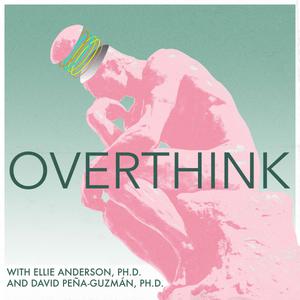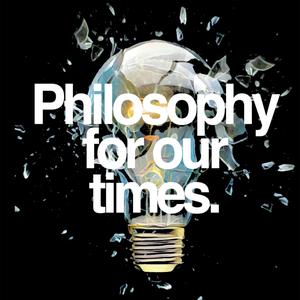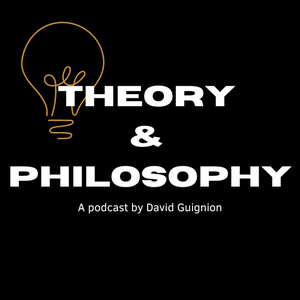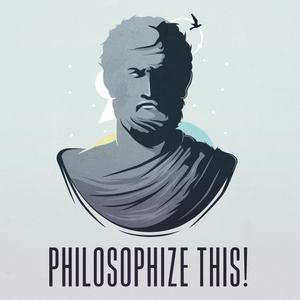
Overthink
Ellie Anderson, Ph.D. and David Peña-Guzmán, Ph.D.
The best of all possible podcasts, Leibniz would say. Putting big ideas in dialogue with the everyday, Overthink offers accessible and fresh takes on philosophy from enthusiastic experts. Hosted by professors Ellie Anderson (Pomona College) and David M. Peña-Guzmán (San Francisco State University).
- 58 minutes 8 secondsDriving
Have you ever wanted to go on a road trip with the psychoanalyst Jacques Lacan? After listening to this episode, you certainly won’t! In episode 119 of Overthink, Ellie and David talk about the experience of driving and the moral and social dilemmas involved with it. How does driving alter our relationship with time and space? What is the “long distance truck driver problem”, and what does it have to do with animal consciousness? And how should we respond to the rise in self-driving cars? Buckle in and get ready for this ride into the philosophy of driving. Plus, in the bonus they dive deeper into the ethics of self-driving cars, exploring the repercussions hacking could have on self-driving cars. What moral philosophy should be programmed into the self-driving vehicles of the future? And who gets to decide?
Check out the episode's extended cut here!Works Discussed:
David Armstrong, A Materialist Theory of The Mind
Kenneth Jackson's, The Crabgrass Frontier
Statamatis Karnouskos, “Self-Driving Car Acceptance and the Rule of Ethics”
Maurice Merleau-Ponty, Phenomenology of Perception
Catherine Millot, Life with Lacan
Lynne Pearce, Drivetime
William Ratoff, “Self-driving Cars and the Right to Drive”
Mark Rowlands, Animal Rights: Moral Theory and Practice
Paul Virilio, Speed and Politics: An Essay on Dromology
Jamieson Webster, “Riding in Cars with Jacques Lacan”
Andreas Wolkenstein, “What has the Trolley Dilemma ever done for us (and what will it do in the future)? On some recent debates about the ethics of self- driving cars”Patreon | patreon.com/overthinkpodcast
Website | overthinkpodcast.com
Instagram & Twitter | @overthink_pod
Email | [email protected]
YouTube | Overthink podcast17 December 2024, 1:00 pm - 53 minutes 55 secondsComfort
Get comfy as you listen to this episode! In episode 118 of Overthink, Ellie and David discuss all things comfortable…and uncomfortable. They talk through the conflation of comfort and luxury, modern architecture’s prioritization of comfort, and whether our need for comfort is the reason for our burning planet. With everything from Maslow’s hierarchy of needs to “the comfort-industrial complex,” this episode will have you questioning what it takes for us to lead a full and happy life. Plus, in the bonus they get into the meaning of the phrase ‘too close for comfort’, alcohol as a destructive form of comfort, and the importance of attachment theory.
Check out the episode's extended cut here!Works Discussed:
Daniel Barber, “After Comfort”
J L Bottorff et al., “The phenomenology of comfort”
Matt Haig, The Comfort Book
Ryan Heavy Head, “Blackfoot Influence on Abraham Maslow, Presented by Narcisse Kainai and Ryan Heavy Head at the University of Montana”
Lynnette Leeseberg Stamler and Ann Malinowski, “Comfort: exploration of the concept in nursing.”
A. H. Maslow, A Theory of Human Motivation
Teju Ravilochan, “The Blackfoot Wisdom that Inspired Maslow’s Hierarchy”.
Peter Sloterdijk, Spheres trilogy
Chögyam Trungpa, Shambhala: The Sacred Path of the WarriorPatreon | patreon.com/overthinkpodcast
Website | overthinkpodcast.com
Instagram & Twitter | @overthink_pod
Email | [email protected]
YouTube | Overthink podcast3 December 2024, 1:00 pm - 1 hour 41 secondsBlack Consciousness with Lewis Gordon
Do you need black skin to be Black? How might concepts such as white privilege be limiting our understanding of how racism works? In Episode 117 of Overthink, Ellie and David chat with philosopher Lewis Gordon about his book, Fear of Black Consciousness. They talk through the history of anti-Black racism, the existential concept of bad faith, why Rachel Dolezal might have Black consciousness, and Frantz Fanon’s experience of being called a racial slur by a white child on a train. From the American Blues to the Caribbean movement of Negritude, this episode is full of insight into Black liberation and White centeredness. In the bonus, Ellie and David go into greater detail about how Black liberation is connected to love.
Check out the episode's extended cut here!
Works Discussed:
Steve Bantu Biko, I Write What I Like
W.E.B. Du Bois, The Souls of Black Folk
Frantz Fanon, Black Skin, White Masks
Edouard Glissant, Introduction à une Poétique du Divers
Jane Anna Gordon, “Legitimacy from Modernity’s Underside: Potentiated Double Consciousness”
Lewis Gordon, Bad Faith and Antiblack racism
Lewis Gordon, Fear of Black Consciousness
Rebecca Tuvel, “In Defense of Transracialism”Patreon | patreon.com/overthinkpodcast
Website | overthinkpodcast.com
Instagram & Twitter | @overthink_pod
Email | [email protected]
YouTube | Overthink podcast19 November 2024, 1:00 pm - 59 minutes 35 secondsExtinction
Dinosaurs, mammoths, ibexes, frogs: a great deal of animals have gone the way of the dodo. Are we next? And would the world be better off without us? In Episode 116 of Overthink, Ellie and David talk about extinction, from Christian eschatology, to the perils of Anthropocene, to cutting-edge de-extinction technology. They turn to animal ethics and scientific dilemmas in search of the ethical approaches that might equip us to think about the extinction of animals, and perhaps even our own. Plus, in the bonus, they talk love, cyborgs, tech bros, and the ethics of the future.
Modem Futura
Check out the episode's extended cut here!
Works Discussed
Thom Van Dooren, Flight Ways: Life and Loss at the Edge of Extinction
Elizabeth Kolbert, The Sixth Extinction: An Unnatural History
Todd May, Should We Go Extinct?
Jacob Sherkow and Henry Greely, “What if Extinction is not Forever?”
Émile Torres, Human Extinction: A History of the Science and Ethics of Annihilation
Children of Men (2006) dir. Alfonso Cuarón
Episode 46. Anti-Natalism
Modem Futura is your guide to the bold frontiers of tomorrow, where technology,...Listen on: Apple Podcasts Spotify
Patreon | patreon.com/overthinkpodcast
Website | overthinkpodcast.com
Instagram & Twitter | @overthink_pod
Email | [email protected]
YouTube | Overthink podcast5 November 2024, 1:00 pm - 58 minutes 59 secondsHope
It’s the one you’ve been hoping for. In episode 115 of Overthink, Ellie and David discuss the meaning of hope, from casual travel plans, to electoral optimism, to theological liberation. They discuss how hope motivates action, and how its rosy tint might be paralyzing. They explore Kant’s ambitions for perpetual peace, and discuss the Marxian imperative to transform the world. They ask, is it rational to hope? How does hoping relate to desire and expectation? And should we hope for what seems realistic, or reach for impossible utopias? Plus, in the bonus, they discuss chivalry, the future, agency, tenure, burritos, and capitalist realism.
Modem Futura
Check out the episode's extended cut here!
Works Discussed
Augustine, Enchiridion on Faith, Hope and Love
Ernst Bloch, The Principle of Hope
Joseph J. Godfrey, A Philosophy of Human Hope
Immanuel Kant, Critique of Practical Reason, Religion Within The Limits of Reason Alone, Perpetual Peace
Jonathan Lear, Radical Hope: Ethics in the Face of Cultural Devastation
John Lysaker, Hope, Trust, and Forgiveness: Essays in Finitude
Adrienne Martin, How We Hope: A Moral Psychology
Karl Marx, Theses on Feuerbach
Anthony Steinbock, Moral Emotions: Reclaiming the Evidence of the Heart
Baruch Spinoza, Short Treatise
Katja Vogt, “Imagining Good Future States: Hope and Truth in Plato’s Philebus”
Modem Futura is your guide to the bold frontiers of tomorrow, where technology,...Listen on: Apple Podcasts Spotify
Patreon | patreon.com/overthinkpodcast
Website | overthinkpodcast.com
Instagram & Twitter | @overthink_pod
Email | [email protected]
YouTube | Overthink podcast22 October 2024, 9:00 am - 1 hour 42 secondsFriendship
Even with endless social scripts around romance, we hardly know what it means to be a good friend. In episode 114 of Overthink, Ellie and David reflect on the highs and lows of friendship, from their own bond to Montaigne’s intimate connection to Étienne de La Boétie. From Aristotle’s Nichomachean Ethics to today’s loneliness epidemic, they question what friends do, how they hold each other accountable, and the deep ways in which our vices and virtues are shaped by our friends. Plus, in the bonus, they talk Ralph Waldo Emerson, intimacy, dyadic relationships, high school friends, and… pluralectics?
Check out the episode's extended cut here!
Modem Futura
Works Discussed
Aristotle, Nichomachean Ethics
Francis Bacon, “Of Friendship”
Lydia Denworth, Friendship: The Evolution, Biology, and Extraordinary Power of Life’s Fundamental Bond
Elijah Milgram, “Aristotle on Making Other Selves”
Michel de Montaigne, “Of Friendship”
Lawrence Thomas, “The Character of Friendship”
Modem Futura is your guide to the bold frontiers of tomorrow, where technology,...Listen on: Apple Podcasts Spotify
Patreon | patreon.com/overthinkpodcast
Website | overthinkpodcast.com
Instagram & Twitter | @overthink_pod
Email | [email protected]
YouTube | Overthink podcast8 October 2024, 1:00 pm - 55 minutes 45 secondsAwkwardness with Alexandra Plakias
Clogged toilets, odious jokes, difficult condolences… awkward moments are everywhere you look. In episode 113 of Overthink, Ellie and David invite philosopher Alexandra Plakias to talk through her research on awkwardness. They discuss everything from hasty clean-ups to snap decisions, from oversharing online to uncomfortable silences, as they explore the ways that awkwardness is bound up with power, morality, and the core scripts of our social expectations. Where does cringe end and awkwardness begin? Are we living through especially awkward times? Who gets to decide what is awkward? And, what if awkward people… don’t exist at all? Plus, in the bonus, they discuss The Office, weddings, weird eye contact, and more.
Check out the episode's extended cut here!
Modem Futura
Works Discussed
Sara Ahmed, The Promise of Happiness
Adam Kotsko, Awkwardness
Alexandra Plakias, Awkwardness: A Theory & “Awkward? We’d Better Own it”
Thomas J. Spiegel, “Cringe”
YouGov poll, "Awkwardness"
Modem Futura is your guide to the bold frontiers of tomorrow, where technology,...Listen on: Apple Podcasts Spotify
Patreon | patreon.com/overthinkpodcast
Website | overthinkpodcast.com
Instagram & Twitter | @overthink_pod
Email | [email protected]
YouTube | Overthink podcast24 September 2024, 1:00 pm - 59 minutes 57 secondsHyperreality
Why is there a Parthenon… in Nashville? Jean Baudrillard might have the answer. In Episode 112 of Overthink, Ellie and David pick apart hyperreality: the provocative suggestion that our reality today is so inundated by signs that the gap between reality and simulation has all but broken down. Your hosts talk through the history and experience of hyperreality, from its presence in Superman and Bridgerton to its uncanny role in legitimizing presidential power. And they wonder: does the idea of hyperreality motivate political action, or does it slide into complacent provincialism?
Check out the episode's extended cut here!
Works Discussed
Jean Baudrillard, America
Jean Baudrillard, Simulacra and Simulation
Daniel Boorstin, The Image: A Guide to Pseudo-Events in America
Don DeLillo, White Noise
Umberto Eco, Travels in Hyperreality
Susan Sontag, Regarding the Pain of Others
Sadie Plant, The Most Radical Gesture
Guy Debord, The Society of the SpectacleAn American Family (1973)
Modem Futura
Superman (1978)
Love Island (2023)
Bridgerton (2005)
Modem Futura is your guide to the bold frontiers of tomorrow, where technology,...Listen on: Apple Podcasts Spotify
Patreon | patreon.com/overthinkpodcast
Website | overthinkpodcast.com
Instagram & Twitter | @overthink_pod
Email | [email protected]
YouTube | Overthink podcast10 September 2024, 1:00 pm - 55 minutes 38 secondsEnvy
Why are you so obsessed with me!? In episode 111 of Overthink, Ellie and David untangle envy, jealousy, and admiration, in everything from Sigmund Freud to Regina George. They think through the role of envy in social media and status regulation alongside Sara Protasi's The Philosophy of Envy, and investigate the philosophical lineage of this maligned emotion. Does the barrage of others’ achievements on social media lead to ill-will or competitive self-improvement? Why do we seek to deny our own envies? And how might Freud's questionable theory of 'penis envy' betray the politics of how we assign and deflect desire?
Check out the episode's extended cut here!
Works Discussed
Aristotle, Rhetoric
Basil of Caesarea, On Envy
Christine de Pizan, City of Ladies
Justin D'arms, Envy in the Philosophical Tradition
Sigmund Freud, Three Essays on the Theory of Sexuality, “Analysis Terminable and Interminable”
Luce Irigaray, This Sex Which is Not One
Plato, Philebus
Plutarch, Moralia, “Of Envy and Hatred”
Sara Protasi, The Philosophy of Envy
Max Scheler, Ressentiment
Genesis 4, Exodus 20Snow White (1937)
Mean Girls (2004)Overthink epiosdes
Modem Futura
60. Influencers
82. Regret
98. Reputation
Modem Futura is your guide to the bold frontiers of tomorrow, where technology,...Listen on: Apple Podcasts Spotify
Patreon | patreon.com/overthinkpodcast
Website | overthinkpodcast.com
Instagram & Twitter | @overthink_pod
Email | [email protected]
YouTube | Overthink podcast27 August 2024, 1:00 pm - 59 minutes 33 secondsIntensity
What do skydiving, guitar-playing teenagers, and deep-seated psychic states have in common? They're all intense! In episode 110 of Overthink, Ellie and David untangle the role of intensity in shaping our aspirations, cultural tropes, and political goals. They trace the concept’s history from its tricky roots in Aristotle's theory of change, passing through medieval science and princely romanticism, to the thrills of skydiving and breathwork today. They turn to Henri Bergson and Gilles Deleuze’s accounts of consciousness and emotion to explore how intensity looks beyond the scientistic impulse to categorize and quantify, and question if intensity is of any help in addressing capitalist acceleration today.
Modem Futura
Check out the episode's extended cut here!
Works Discussed
Aristotle, Categories
Zygmunt Bauman, Liquid Life
Henri Bergson, Time and Free Will
Gilles Deleuze, Difference and Repetition
Gustav Theodor Fechner, Elements of Psychophysics
Tristan Garcia, The Life Intense: A Modern Obsession
Mary Beth Mader, “Whence Intensity? Deleuze and the Revival of a Concept”
Benjamin Noys, The Persistence of the Negative
Nick Srnicek & Alex Williams, “#Accelerate: Manifesto for an Accelerationist Politics”
The Bachelorette
Inside Out 2 (2024)
Mentioned Overthink episodes
61 - Self Knowledge
32 - Paradox
107 - Organisms
Modem Futura is your guide to the bold frontiers of tomorrow, where technology,...Listen on: Apple Podcasts Spotify
Patreon | patreon.com/overthinkpodcast
Website | overthinkpodcast.com
Instagram & Twitter | @overthink_pod
Email | [email protected]
YouTube | Overthink podcast13 August 2024, 1:00 pm - 56 minutes 38 secondsPredictive Brain with Andy Clark
Phantom phone buzzes? Painless mosquito bites? Toy masks flipped inside-out? It might be your brain bringing order to its complex world. In episode 109 of Overthink, Ellie and David interview cognitive philosopher Andy Clark, whose cutting edge work on perception builds off theories of computation to offer an intriguing new model of mind and experience. He explains why the predictive processing model promises a healthier relation to neurodiversity, and they all explore its real-world applications across placebos, road safety, chronic pain, anxiety, and even the accidental success of ‘positive thinking.’ Plus, in the bonus, Ellie and David discuss depression, plasticity, qualia, zombies, and what phenomenologists can bring to the cognitive table.
Modem Futura
Check out the episode's extended cut here!
Works Discussed:
Thomas Bayes, An Essay Towards Solving a Problem in the Doctrine of Chances
Anjali Bhat, et al., "Immunoceptive inference: why are psychiatric disorders and immune responses intertwined?"
Andy Clark, The Experience Machine: How Our Minds Predict and Shape Reality
Sarah Garfinkel, et al., "Knowing your own heart: distinguishing interoceptive accuracy from interoceptive awareness"
Hermann von Helmholtz, Treatise on Physiological Optics
David Hume, A Treatise of Human Nature
Alva Nöe, Out of Our Heads: Why You Are Not Your Brain, and Other Lessons from the Biology of Consciousness
Anil Seth, Being You
This Might Hurt (2019)
Modem Futura is your guide to the bold frontiers of tomorrow, where technology,...Listen on: Apple Podcasts Spotify
Patreon | patreon.com/overthinkpodcast
Website | overthinkpodcast.com
Instagram & Twitter | @overthink_pod
Email | [email protected]
YouTube | Overthink podcast30 July 2024, 1:00 pm - More Episodes? Get the App
Your feedback is valuable to us. Should you encounter any bugs, glitches, lack of functionality or other problems, please email us on [email protected] or join Moon.FM Telegram Group where you can talk directly to the dev team who are happy to answer any queries.
 Philosophy For Our Times
Philosophy For Our Times
 Theory & Philosophy
Theory & Philosophy
 Philosophy Bites
Philosophy Bites
 The Partially Examined Life Philosophy Podcast
The Partially Examined Life Philosophy Podcast
 Philosophize This!
Philosophize This!